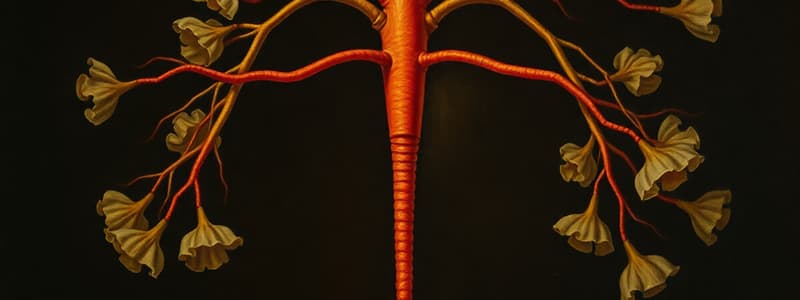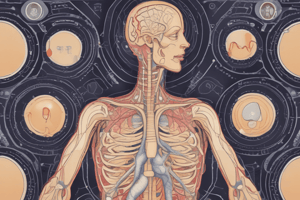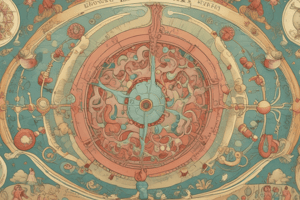Podcast
Questions and Answers
What regulates long-term processes in the body?
What regulates long-term processes in the body?
- Endocrine system (correct)
- Muscular system
- Nervous system
- Circulatory system
What does the hypothalamus produce?
What does the hypothalamus produce?
ADH, oxytocin, and regulatory hormones
Which gland secretes Melatonin?
Which gland secretes Melatonin?
- Thyroid Gland
- Pituitary Gland
- Adrenal Medulla
- Pineal Gland (correct)
Paracrine communication involves the release of hormones into the bloodstream.
Paracrine communication involves the release of hormones into the bloodstream.
What type of cells are target cells?
What type of cells are target cells?
What are the three groups into which hormones can be divided?
What are the three groups into which hormones can be divided?
The adrenal medulla secretes __________.
The adrenal medulla secretes __________.
What are the primary hormones secreted by the thyroid gland?
What are the primary hormones secreted by the thyroid gland?
Flashcards are hidden until you start studying
Study Notes
The Endocrine System
- Regulates long-term processes such as growth, development, and reproduction.
- Uses chemical messengers to relay information and instructions between cells.
Major Endocrine Organs and Their Hormones
- Hypothalamus: Produces antidiuretic hormone (ADH), oxytocin, and regulatory hormones.
- Pituitary Gland:
- Anterior Lobe: Produces adrenocorticotropic hormone (ACTH), thyroid-stimulating hormone (TSH), growth hormone (GH), prolactin (PRL), follicle-stimulating hormone (FSH), luteinizing hormone (LH), and melanocyte-stimulating hormone (MSH).
- Posterior Lobe: Releases oxytocin and ADH.
- Pineal Gland: Produces melatonin.
- Thyroid Gland: Produces thyroxine (T4), triiodothyronine (T3), and calcitonin (CT).
- Parathyroid Glands: Produce parathyroid hormone (PTH).
- Adrenal Glands:
- Adrenal Medulla: Produces epinephrine (E) and norepinephrine (NE).
- Adrenal Cortex: Produces cortisol, corticosterone, aldosterone, and androgens.
- Pancreas: Produces insulin and glucagon.
- Gonads:
- Testes: Produce androgens (especially testosterone) and inhibin.
- Ovaries: Produce estrogens, progestins, and inhibin.
Organs with Secondary Endocrine Functions
- Heart: Secretes natriuretic peptides (ANP and BNP).
- Thymus: Secretes thymosins.
- Adipose Tissue: Secretes leptin.
- Digestive Tract: Secretes numerous hormones involved in the coordination of system functions, glucose metabolism, and appetite.
- Kidneys: Secrete erythropoietin (EPO) and calcitriol.
Homeostasis and Intercellular Communication
- Direct Communication: Exchange of ions and molecules between adjacent cells across gap junctions; occurs between two cells of the same type.
- Paracrine Communication: Uses chemical signals to transfer information between cells within a single tissue; most common form of intercellular communication.
- Endocrine Communication: Endocrine cells release chemicals (hormones) into the bloodstream, altering metabolic activities of tissues and organs simultaneously.
- Synaptic Communication: Ideal for crisis management; occurs across synaptic clefts; chemical message is "neurotransmitter"; limited to a very specific area.
Hormones
- Classes of Hormones: Can be divided into three groups - amino acid derivatives, peptide hormones, and lipid derivatives.
- Secretion and Distribution: Hormones circulate freely or travel bound to carrier proteins.
Amino Acid Derivatives
- Small molecules structurally related to amino acids.
- Derivatives of Tyrosine:
- Thyroid hormones (T4 and T3), epinephrine, norepinephrine, and dopamine.
Studying That Suits You
Use AI to generate personalized quizzes and flashcards to suit your learning preferences.




